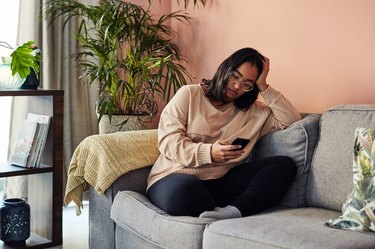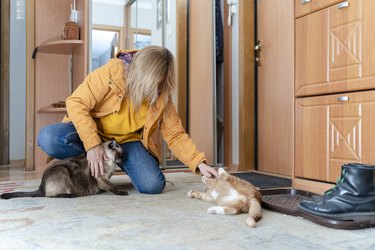
Mental health professionals were concerned about loneliness well before we all started social distancing to help contain the spread of the novel coronavirus.
"We were in the middle of a loneliness epidemic before COVID-19, and having to further distance from the world ultimately can be detrimental to our overall mental health and wellbeing," says Nina Vasan, MD, MBA, clinical assistant professor of psychiatry at Stanford University and chief medical officer of Real, an on-demand therapy platform.
Video of the Day
Video of the Day
Get tips on how to stay healthy, safe and sane during the novel coronavirus pandemic.
Loneliness is a state of mind of being alone or separated from others. It should not be confused with social isolation, which is physical separation from other people, commonly associated with living alone.
"In that sense, it is possible to experience loneliness with others around, and it is possible to be alone but not feel lonely," Dr. Vasan says.
Here's a closer look at loneliness and the startling ways it can affect your health.
The Dangers of Loneliness
Mental health professionals are learning that loneliness can pose significant risks to your health.
1. Loneliness Is Linked With Depression
While loneliness is distinct from depression, it has been associated with depressive symptoms.
Researchers found that social disconnectedness is a unique risk factor for loneliness, which predicted higher depressive symptoms in individuals, according to a January 2020 study in the Lancet. The study also supported the reverse: People with depression were also more likely to feel isolated.
2. It's Connected to Inflammation
There seems to be a link between loneliness and inflammation, according to a December 2015 study in the Proceedings of the National Academy of Sciences. Research suggests that loneliness may weaken the body's immune response to cause more inflammation, which can in turn increase risk for chronic disease.
A July 2020 report in the Perspectives on Psychological Science found that interpersonal stressors, such as loneliness, are connected to increased risk of diseases, including respiratory viruses, evoking the possibility of greater vulnerability to SARS-CoV-2, the virus that causes COVID-19.
"Loneliness can be harmful for long-term immunity, making you more susceptible to pathogens like bacteria and viruses," Dr. Vasan says.
"It is possible to experience loneliness with others around, and it is possible to be alone but not feel lonely."
3. Loneliness Is Associated With Type 2 Diabetes
People over the age of 50 who report higher levels of loneliness are more likely to develop type 2 diabetes later in life, according to a study published September 2020 in Diabetologia.
Although the researchers weren't clear on why, they found that loneliness significantly upped a person's chances of developing type 2 regardless of other risk factors like their physical activity or BMI levels.
4. It's Tied to Higher Chances of Heart Disease
Loneliness may increase a person's odds of developing heart problems, too. A May 2016 study in Heart found about a 30 percent higher chance of stroke or heart disease among people who scored poorly on measures of social relationships.
The researchers attribute this link to a variety of behavioral, biological and psychological factors, such as behaviors like smoking or physical inactivity that are more common among individuals who are lonely.
5. Loneliness Is Linked to High Blood Pressure
People who experience loneliness may be more susceptible to high blood pressure, according to a first-of-its-kind March 2010 study in Psychology and Aging. Still referenced widely today, the research linked levels of loneliness with greater increases in systolic blood pressure over a four-year period among a diverse group of people.
The mechanism behind this link is not completely understood, but it points to how loneliness may be associated with earlier or more dramatic changes to the arteries, the authors note.
6. It's Associated With Cognitive Decline and Dementia
Loneliness can pose unique challenges to older adults, according to a February 2020 National Academies of Sciences, Engineering and Medicine report, due to risk factors like living alone or the loss of family and friends.
That's particularly problematic because older adults are also already at higher risk of certain loneliness-linked health conditions, such as cognitive decline and dementia.
An August 2019 study in the International Journal of Environmental Research and Public Health used data from the Chinese Longitudinal Healthy Longevity Survey to investigate the association between loneliness and cognitive decline among older men and women in China. The researchers concluded that loneliness was a significant risk factor for cognitive impairment among older men, but not women.
Earlier, loneliness was linked with a 40 percent increased risk of dementia in an October 2018 Journal of Gerontology: Psychological Sciences study analyzing data from 12,000 participants collected over 10 years, the largest sample for this topic.
"If aging adults are living in environments with limited social interaction, their dementia can worsen over time," Dr. Vasan says.
5 Ways to Cope With Loneliness

1. Join a Recurring Class, Club or Activity
Sign up for something you enjoy with others to help you meet people who have similar interests as you. When it becomes a regular event, you'll have something to look forward to.
Start with your existing skills and interests — whether it's art, drama or gardening — and use this as an opportunity to advance to the next level.
"Engaging in activities can help distract you from loneliness and isolation," Dr. Vasan says. "With most of us now unable to engage in traditional in-person activities, I recommend getting creative with virtual interactions, such as live-streamed group classes, watch parties on Netflix or Prime, arts and crafts and online game or trivia nights."
2. Find Ways to Give Back to Your Community
Selflessly caring for others will not only optimize their wellbeing, but also your own. Helping people can deliver meaning to your life in the face of loneliness.
Start with a task you can do from afar, like making and sending cards for people going through cancer treatment with a group like Chemo Angels. If you're comfortable giving back in person, consider volunteering at a local food bank.
"Getting involved in helping people not only feels good, but you connect with others who have a heart of service," says educational psychologist Roseann Capanna-Hodge, EdD, LPC.
3. Surround Yourself With What Gives You Warmth
Engage in activities that bring you joy and spend time with people who deliver warmth.
This looks different for different people: For you, maybe that means strengthening an existing connection with a loved one, adopting a pet or even taking a short afternoon nap. Experiencing these little joys can fight loneliness by helping you reconnect with yourself.
"Be good to yourself by finding small things that bring you joy," Dr. Vasan says. "Enjoy online retail therapy, a warm bath, reconnect with an old friend — the smallest things can mean the most at this time."
4. Look to the Future
"Loneliness feels awful, and one can get stuck in those sad and hurt feelings, but focusing on the future gives you hope, purpose and direction," Capanna-Hodge says.
To help you plan ahead, she suggests putting aspirations and unfulfilled wishes onto a virtual or real-life vision board.
"Creating a vision board is a powerful way to get clear on what is important in your life, as well as what your future goals are," she says.
It's OK to start small: Cultivate excitement about cooking a new cuisine or visiting a new local park in the coming weeks or months.
5. Get Professional Support
In some cases, it may be helpful to seek therapy to process and work through loneliness. Mental health professionals can suggest beneficial coping mechanisms that might work best for your individual situation.
"The most important thing you can do for yourself is asking for help when you need it," Dr. Vasan says. "Medical professionals are out there and want to help you get better. If you feel lonely, it may be helpful to contact a psychiatrist or therapist or connect with a therapy hotline or app."
Concerned About COVID-19?
Read more stories to help you navigate the novel coronavirus pandemic:
- The Lancet: “Social disconnectedness, perceived isolation, and symptoms of depression and anxiety among older Americans (NSHAP): a longitudinal mediation analysis”
- Proceedings of the National Academy of Sciences: “Myeloid differentiation architecture of leukocyte transcriptome dynamics in perceived social isolation”
- Heart: “Loneliness and social isolation as risk factors for coronary heart disease and stroke: systematic review and meta-analysis of longitudinal observational studies”
- Psychology and Aging: “Loneliness predicts increased blood pressure: 5-year cross-lagged analyses in middle-aged and older adults.”
- International Journal of Environmental Research and Public Health: “The Association Between Loneliness and Cognitive Impairment among Older Men and Women in China: A Nationwide Longitudinal Study”
- Journal of Gerontology: Psychological Sciences: “Loneliness and Risk of Dementia”
- Diabetologia: "Loneliness and type 2 diabetes incidence: findings from the English Longitudinal Study of Ageing"
Is this an emergency? If you are experiencing serious medical symptoms, please see the National Library of Medicine’s list of signs you need emergency medical attention or call 911.